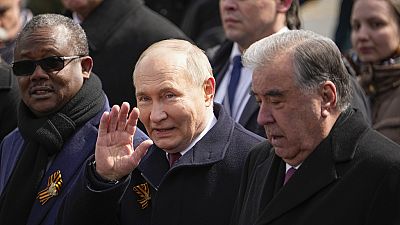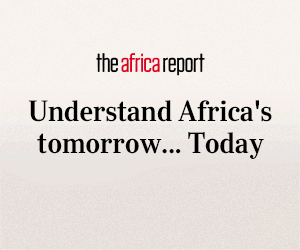Putin criticizes Western nations on 79th victory day anniversary

Although few veterans of what Russia calls the Great Patriotic War are still alive 79 years after the fall of Berlin to the Red Army , the victory remains the most important and revered symbol of Russia’s prowess. , as well as a key element of national identity.
Mr. Putin has made Victory Day — the country’s most important secular holiday — a pillar of his quarter-century in power and a justification for his military action in Ukraine .
Two days into his fifth term, he led festivities across Russia to remember the nation’s wartime sacrifices.
“Victory Day unites all generations ,” Mr. Putin said in a speech in Red Square , the coldest May 9 in decades, with some snow showers. “We are moving forward, building on our centuries-old traditions and are confident that together we will ensure a free and secure future for Russia.”
Military Display
As battalions marched and military equipment – old and new – rumbled across the cobblestones, the skies briefly cleared to allow warplanes to fly overhead , some of which trailed smoke in the colors white, red and blue of the Russian flag .
Mr Putin praised the courage of troops fighting in Ukraine and castigated the West, accusing it of “fueling regional conflicts, inter-ethnic and inter-religious quarrels and trying to contain sovereign and independent centers of development global” .
As tensions between Russia and the West over Ukraine reach their highest level since the Cold War, Mr. Putin once again recalled Moscow’s nuclear power .
“Russia will do everything to prevent a global confrontation, but will not allow anyone to threaten it ,” he said. “Our strategic forces are combat ready.”
Nuclear-capable Yars intercontinental ballistic missiles were fired into Red Square, underscoring his message.
Historical Context
The Soviet Union lost approximately 27 million people during World War II, an estimate that many historians consider conservative, which scarred virtually every family.
Nazi troops invaded much of the western Soviet Union in June 1941, before being pushed back to Berlin, where the USSR flag, the hammer and sickle , was raised over the above the ruined capital. The United States , United Kingdom , France, and other allies mark the end of the war in Europe on May 8.
The immense suffering and sacrifices made in cities like Stalingrad , Kursk and Leningrad , Mr. Putin’s hometown (now St. Petersburg ), still stand as a powerful symbol of the country’s ability to meet seemingly insurmountable challenges.
Since coming to power on the last day of 1999, Mr Putin has made May 9 an important part of his political agenda, complete with missiles, tanks and fighter jets. Medal-winning veterans joined him on Thursday to review the parade, and many of them – including the president – wore the black and orange St. George ribbon , traditionally associated with VE Day.
Some 9,000 soldiers, about 1,000 of whom fought in Ukraine, took part in Thursday’s parade.
International Presence
Although the ambassadors of the United States and the United Kingdom did not attend the parade, other dignitaries and the presidents of several former Soviet nations joined Mr. Putin, as well as some other Moscow allies, including the leaders from Cuba , Guinea -Bissau and Laos .
Mr. Putin, 71, often talks about his family history and recalls memories of his father, who fought on the front lines during the Nazi siege of the city and was seriously injured.
He says his father, also named Vladimir, came home from a military hospital during the war and saw workers trying to take away his wife, Maria, who had been declared dead of starvation.
For several years, Mr. Putin carried a photo of his father in Victory Day parades, as others did in honor of war veteran relatives, in what was called the ” immortal regiment” .
These protests were suspended during the coronavirus pandemic and then again for security reasons after fighting began in Ukraine.
As part of its efforts to capitalize on the Soviet legacy and trample any attempt to question it, Russia has introduced laws that criminalize the “rehabilitation of Nazism” , including punishing the “desecration” of memorials or questioning the Kremlin’s versions of World War II history.
When he sent troops to Ukraine on February 24, 2022, Mr. Putin invoked World War II to try to justify his actions, which Kiev and its Western allies denounced as an unprovoked war of aggression . Mr. Putin has cited the “denazification” of Ukraine as one of Moscow’s main goals, falsely describing the government of Ukrainian President Volodymyr Zelenskyy , who is Jewish and lost relatives in the Holocaust , as neo -Nazis.
Putin’s Narrative
Putin has tried to pass off Ukraine’s reverence of some of its nationalist leaders who cooperated with the Nazis during World War II as a sign of kyiv’s alleged Nazi sympathies. He regularly made unfounded references to Ukrainian nationalist figures such as Stepan Bandera , killed by a Soviet spy in Munich in 1959, to justify Russian military action in Ukraine.
Legacy of the USSR
Many observers see Mr. Putin’s focus on World War II as part of his efforts to revive the influence and prestige of the USSR and its reliance on practices Soviets.
“It was the continued self-identification of the USSR as the victor of Nazism and the absence of any other strong legitimacy that forced the Kremlin to declare ‘denazification’ as the goal of the war ,” Nikolay Epplee said in a commentary for the Carnegie Russia Eurasia Center.
According to him, Russian leaders have locked themselves into a worldview limited by the Soviet past.




